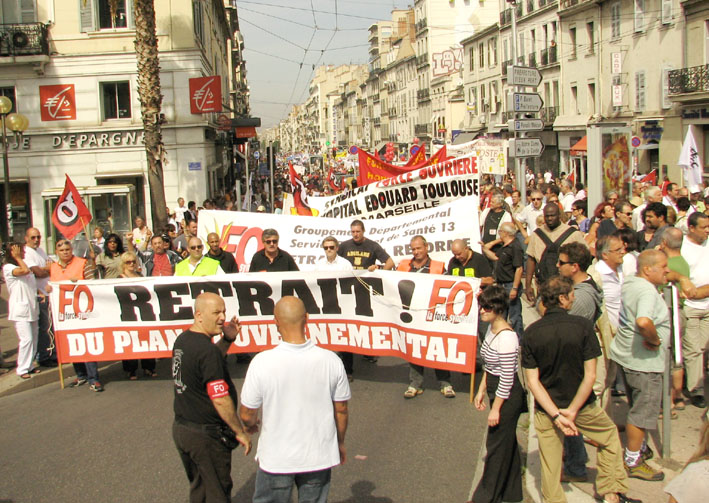FROM Paris to Marseille, from Lille to Lyon, an unprecedented number of workers, a reported three million, have been protesting against pension reforms in France.
Bernard Thibault, General Secretary of the CGT union said: ‘It’s clear we’re directly oppposed and this isn’t our fault. It’s the president who’s being intransigent.’
The reforms will unfairly penalise tens of millions including women workers who have taken maternity leave as they will have to stay in jobs well into their sixties to earn full benefits.
France cannot afford many days like these. The second 24-hour strike in a month affected transport, schools and other public and private sectors.
The lower house of parliament approved the bill last week but it still has to go through the Senate, which is due to debate the measure next month
Flights and train services were halted, schools were disrupted and a leading newspaper failed to appear on the streets in France on Thursday as workers staged their second 24-hour strike against the unpopular pension reforms.
Airlines cancelled between 40 and 50 per cent of flights and railways reduced intercity services by half.
Unions, said that up to three million had marched, and they hoped the turnout would oblige the government to back down over the flagship reform of president Nicolas Sarkozy’s five-year term, which would raise the minimum legal retirement age to 62 from 60 and the age at which people can retire on a full pension to 67 from 65.
‘If the government doesn’t alter its intransigent position, it will obviously be our duty and responsibility as unions to envisage further initiatives,’ said CGT leader Thibault.
A partial strike disrupted programmes at the public radio stations France Info and France Inter, and the printed version of the afternoon Le Monde newspaper did not appear.
The government says the legislation is essential to erase a growing deficit in the pay-as-you-go pension system, curb rising public debt and preserve France’s AAA credit rating, which enables it to borrow at the lowest financial market rates.
The mass unrest mirrors action elsewhere in Europe as indebted governments cut spending, notably Greece and Spain where more protests loom in the next two weeks in response to some of the harshest austerity measures in the euro zone.
Sarkozy, already under attack from the European Union for deporting Roma and from the media over a lingering financial scandal, is facing fierce and growing opposition to his pension reform plans but says he will press on regardless.
The issue is central to both his reform programme and his political survival strategy, with less than two years to go before he seeks re-election.
Some unions are considering calling an indefinite general strike if their demands are ignored.
The law particularly penalises anybody who is unable to work the full 40 or 41 years – a population which includes a huge proportion of women.
Sarkozy said earlier this month that ‘there is no question of backtracking’ on the retirement age.
A survey carried out for the CGT union and published last Tuesday in the communist newspaper L’Humanite said 70 per cent of the French oppose raising the retirement age.
French workers are determined to stop Sarkozy’s pensions reform, and are calling for action to bring down his regime.
